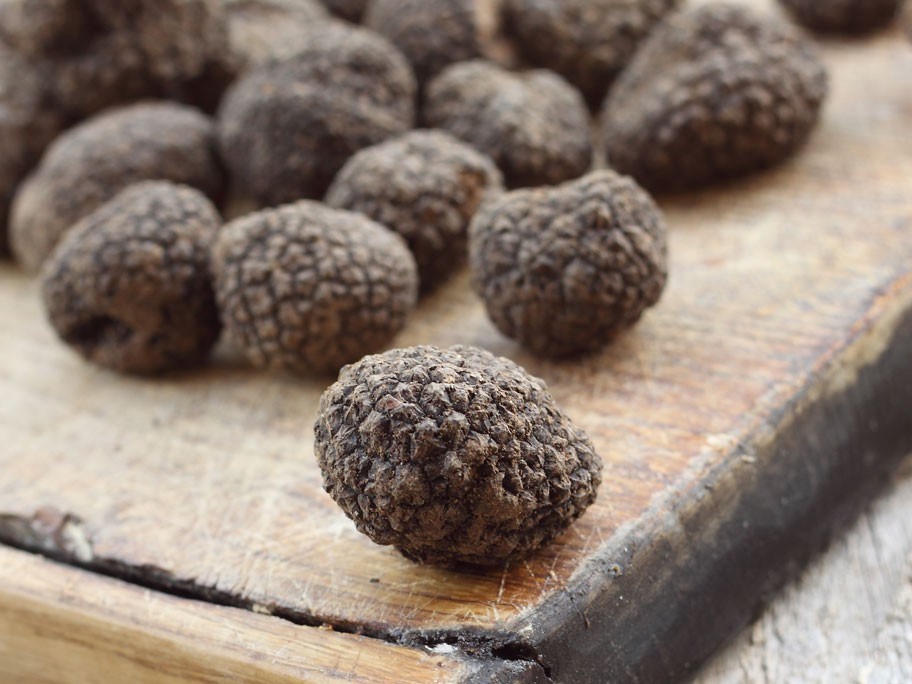The admirable effort to use food sourced nearby has been gaining traction for a few years in the restaurant industry here, and most people agree this is a good thing, but there's one very popular food that just isn't currently found close by.
The increasingly elusive truffle tastes so good that it sells for astronomically high prices and travels from far off lands like France and Italy, or China and Australia. The number of truffles being produced in Europe is declining. Today, the truffle harvesters in Europe are reportedly selling 30 tons a year and 100 years ago the amount was 2,000 tons a year.
Food industry innovators haven't found a way to duplicate the truffle taste in a lower cost alternative, like we find with crabmeat.
New Zealanders started experimenting with truffle production in the 1980s and Australians followed in the 1990s.
Peter Kerr of the Financial Review in Australia reported in August that there is a truffle glut down under. For two years in a row, the crop in Australia was too big at about 4,000 tonnes, reports Kerr. The major Australian producers need to agree to a shared marketing arrangement to avoid a truffle glut, he writes.
The heart of the truffle industry is found in France and Italy in regions where the summers are warm and moist. Truffle sniffing dogs find perfectly aged truffles buried at the base of oak and hazelnut trees.
The Chinese have jumped into the international game with what many claim is an inferior product. Truffle experts agree that the Chinese truffles are inferior simply because Chinese harvesters pick the truffles too soon. Using rakes, the Chinese people in the business visit known truffle areas and rake the soil until they find the fungi.
While truffle lovers frown on the Chinese harvest method, a group of people in B.C. are exploring the possibility of producing truffles right here at home.
Shannon Berch of the University of B.C. Botany Department is one of the people involved in the initiative.
According to Berch, our climate isn't great for truffle production and our soil chemistry isn't ideal. That hasn't stopped an enterprising group called the Research and Development Committee of the Truffle Association of B.C. from spending more than five years creating truffle orchards.
"There's a lot you have to do right and it is expensive to get in the ground," says Berch of the early efforts.
"We have to do a lot of modification to the soil," she says. "It is very expensive for us to buy the inoculated seedlings and put them in the ground and do all the testing."
She says growers in B.C. are at the northern climate edge of where Perigord black truffles grow.
If the local entrepreneurs are successful in producing a quality product they stand to cash in on a very lucrative industry. Stanley Ho of Macau purchased a huge truffle picked near Pisa, Italy at a charity auction for a whopping $330,000 in 2007.
The declining harvest amounts in France and Italy have created a black-market industry reported on by the CBS television show 60 Minutes recently.
Reporter Lesley Stahl went to Europe and found that people are stealing truffles, stealing truffle sniffing dogs and cutting inferior Chinese truffles in with European truffles.
Berch confirms that if the farmers experimenting with truffles here are successful they could pull in significant returns on long-term investments.
"We're hopeful, we're patiently waiting for results," says Berch.
The efforts here consist of a demonstration site at the UBC farm in Vancouver at the main campus along with a number of private orchards in the Okanagan, Victoria and Vancouver. The experimental growers are working with hazelnut and oak trees that are not native to B.C. but were introduced here centuries ago.
Berch says summer on our coast isn't quite warm enough and summer in the Okanagan valley doesn't last quite long enough.
Some American fungus fans are ahead of the people here trying to produce truffles. Berch says there are truffle growers in California, Tennessee and South Carolina. The Tennessee producers, she says, had a good season last year producing about 90 kg of product.
Berch plans to attend the Oregon Truffle Festival set for the end of this month and she plans to attend the National Truffle Festival in North Carolina at the end of February.
The festival in Eugene, OR is the place to be, says Berch, to get immersed in the truffle business.
"I have been invited to do presentations there," she says.
For the sake of following our wish to source foods closer to home there's a strong desire to see the truffle association here in B.C. succeed in producing the elusive delicacy right here at home.




